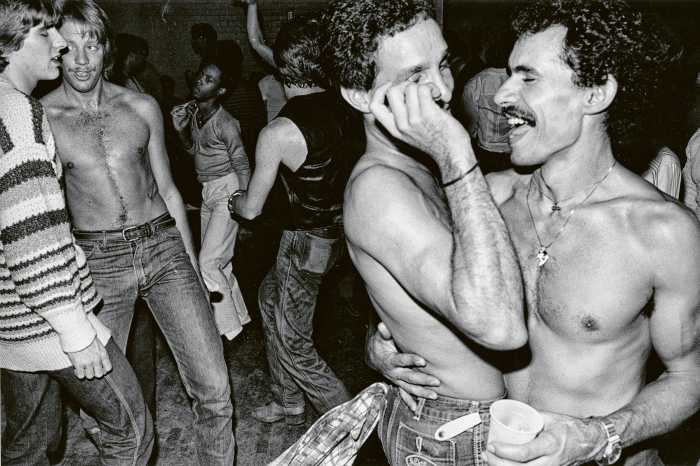London film critic and memoirist talks about love and the movies
By: WILL McKINLEY
CHOKING ON MARLON BRANDO
By Antonia Quirke
Overlook Press
320 pages; $13.95
I just read the memoir of a British film critic. Sounds about as exciting as a Merchant Ivory film festival, right? Well, what if I told you the critic was a randy blonde who dishes about the actors she has loved – on screen and off – with such phrases as, “I like my drinks like my men. All over the bathroom floor when I get home.”
“Choking on Marlon Brando,” now out in paperback, is the witty and endearingly confessional memoir of London-based arts writer and BBC host Antonia Quirke. And it's two books in one. The first is a tribute to her love of men; the second, a tribute to her love of movies – and the men who make them memorable.
From Robert Mitchum to Johnny Depp, Quirke has something insightful to say about every significant actor of the last half century. And she's almost always dead on.
The 30-something author deftly weds her two passions into one engaging narrative, with a romantic misadventure triggering a recollection of a classic film or an iconic performance. Reading this book will either make you want to rent a bunch of DVDs, or go out and get laid. Or both.
I spoke with Antonia Quirke on the phone from her native Manchester.
WILL McKINLEY: Can you explain your book's title?
ANTONIA QUIRKE: When I was ten, I came downstairs in the middle of the night. My parents were watching “A Streetcar Named Desire” and I had a little collapse.
WM: Brando's performance made you lose control of your body?
AQ: Yes. It was just the full-on sex appeal, his charisma. I can remember very clearly being entirely overcome by his physique, his voice, his face. I was very young and wasn't entirely sure what to do with those feelings. I just wigged out.
WM: What was the first movie you ever saw?
AQ: I had never seen a movie before that one.
WM: How did you manage to live ten years without seeing a movie?
AQ: My parents didn't have a TV. They didn't believe in it. I was aware of television, but I wasn't aware of movies at all. I had wound myself up quite a lot that night before I came downstairs, listening to the drama that was going on in our living room and then realizing that it was happening on screen, rather than in real life. All of that blurring of boundaries just overwhelmed me completely. The wonder of cinema hit me square between the eyes.
WM: The technology that exists today – where kids can see everything on demand, or make their own movies and post them on the Internet – is that a good or a bad thing?
AQ: I think it's bad. The other day I was swimming and there was a group of schoolgirls. They spent the whole day taking photographs of each other and uploading them to Facebook. They weren't actually living their life; they were commemorating it as if it were a movie they were in.
WM: Maybe the next generation's rebellion will be to throw all of this aside and just live.
AQ: I doubt it. Everybody is performing to a certain extent now. Phoniness is overtaking us. People use phrases about breaking up that they've seen in movies to break up with people in real life. And they don't even realize they're doing it. It's like a virus that's going through the culture.
WM: Speaking of phoniness, you developed this idolatry toward actors as a kid. But then you grew up and dated one, and the result was not pretty. Did that change your view?
AQ: Yes. He didn't like to be in a room filled with known people. He preferred to be with strangers, people he could win, because it was a performance. It was a constant performance. I watched him and I became a sort of archivist of his great performances at the dinner table. I became a storyteller because of him. I would never have written the book if I hadn't been with him and learned to tell stories in that kind of way. It was as dangerous as it was terrific.
WM: True or false? Civilians should never date actors.
AQ: You should never, unless you want to go through hell and back. Appreciate them on the screen, but never in your bed. The two shouldn't mix.
WM: What's the last movie you saw?
AQ: I went to see “The Dark Knight” the other day and I walked out after 20 minutes.
WM: Why?
AQ: The movie comes on like a steam train, and doesn't let up. But not in a good way. It's got a chaotic pace, a sort of frenetic panic. It's a one-pitch tone. And I thought, “Christ. I'm sitting here watching a man in a cape. What was I expecting?” I have been fooled by the marketing yet again.
WM: Did you stay long enough to see Heath Ledger?
AQ: I did. He does this sort of lip-licking every two seconds. It's a phony tic in a way that makes you feel, “That's put on. That's not felt.” He's a good actor, but I didn't buy it.
WM: Current movies have lost me. They've lost my trust.
AQ: I'm with you on that. I find myself completely flummoxed by the fuss about certain films. I don't believe people anymore when they rave about things. Anyone who denies that cinema has taken a dip is lying.
WM: Don't you feel betrayed, as a lover of movies?
AQ: Oh yeah. I think I just sort of fell out of love with cinema. Being a reviewer just wrung it out of me. That kind of love can't last forever and when you're let down you display the traits of a disappointed lover.
WM: What's your favorite movie?
AQ: “Serpico,” probably.
WM: Don't the New York movies of the '70s make you hate today's movies even more?
AQ: Yes. I love the chaos of the streets in those movies, like “Serpico” or “Shaft” or “Dog Day Afternoon.” New York was a mess. It was a frightening place, where you had to be really careful. You couldn't step out the front door without being mugged. The way that Giuliani cleaned up the streets was great for New York City but terrible for cinema.
WM: You were recently here in the Village to promote the book.
AQ: Yes, I did a reading and a screening with clips from different movies.
WM: And did you pay the licensing fees for those clips?
AQ: What do you think? Honestly I'm more worried about getting sued for what I wrote in the book about Barbra Streisand.
WM: You can't be sued for telling the truth. As a fellow movie lover, I thank you for exposing “The Mirror Has Two Faces” as one of the worst films of all time.
AQ: More people have said they like that chapter than any other. Everyone has seen that movie, either deliberately or by accident too many times on TV late at night. And you're sitting there thinking, “I can't believe this.” She's just awful.
WM: Are you a film snob?
AQ: Hardly. I love to watch movies on TV, when they've got loads of adverts and you have time to get a takeaway and your flatmate's asleep. Most of us have seen most of the movies we love that way. I remember thinking once that I was the film critic for a national newspaper and I've only seen “The Godfather” in the middle of the night on telly.
WM: Film Forum here in New York is going to be running Coppola's restored versions of “The Godfather” and “The Godfather, Part 2” from September 12 through October 2. You should come and visit.
AQ: I'd love to!
WM: So what's coming up next for you?
AQ: Well, it looks like they're going to turn the book into a movie and, if it happens, I'll be writing the screenplay.
WM: Congratulations. Is it safe to say the character of Antonia Quirke will not be played by Barbra Streisand?
AQ: Yes. I think you can safely say that.
































